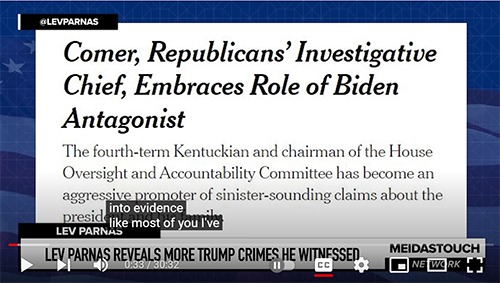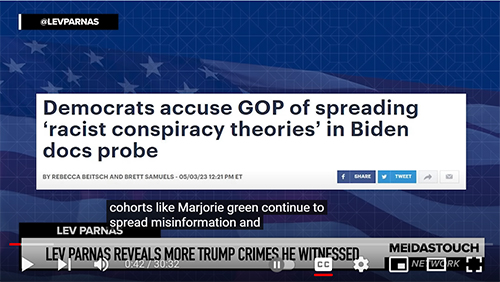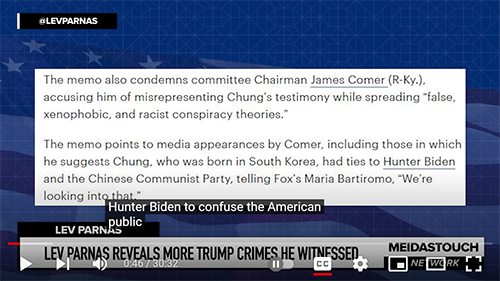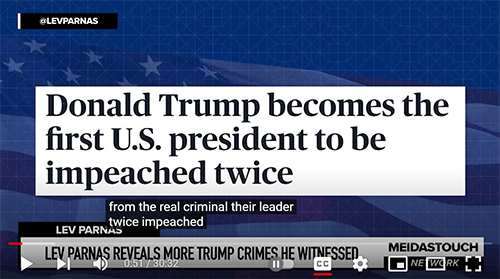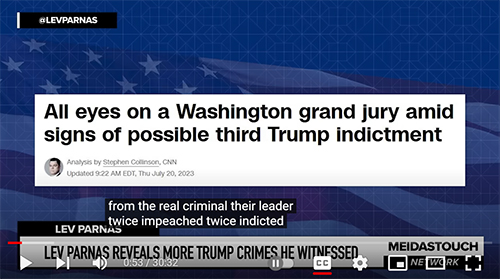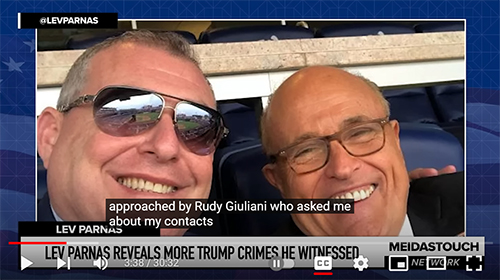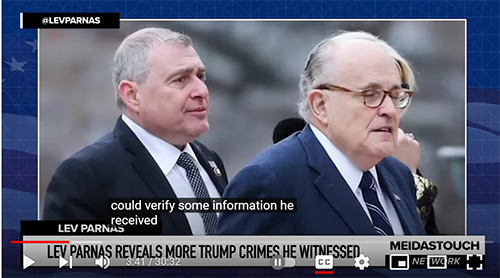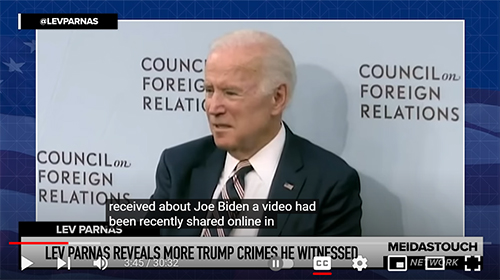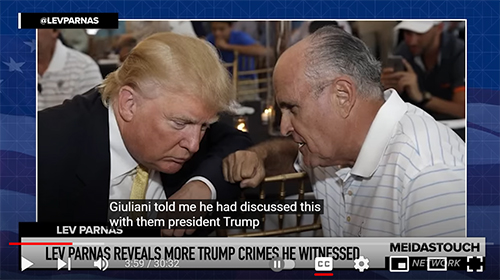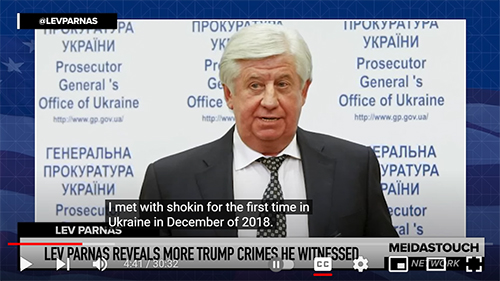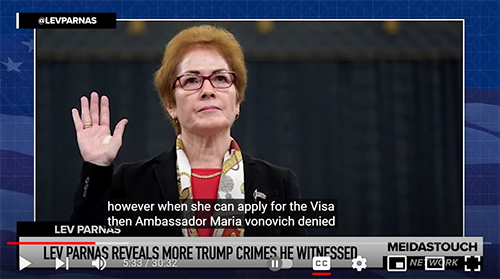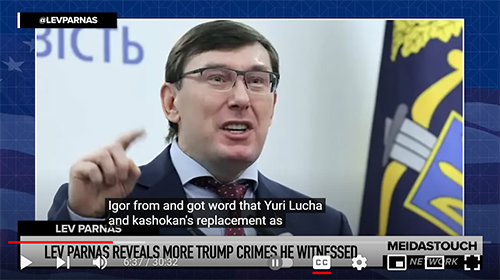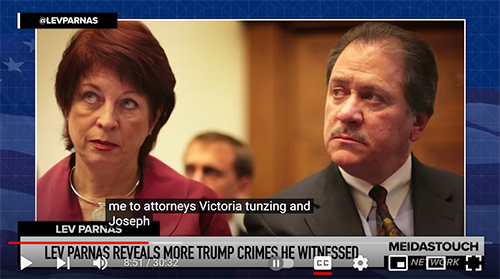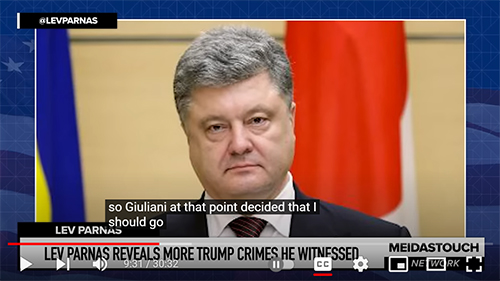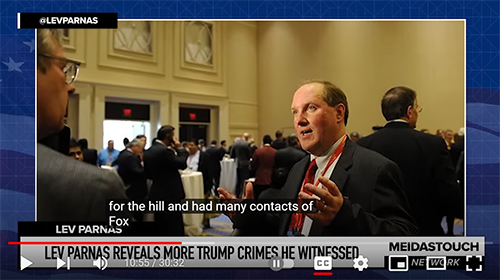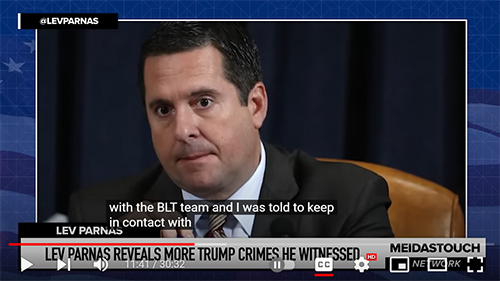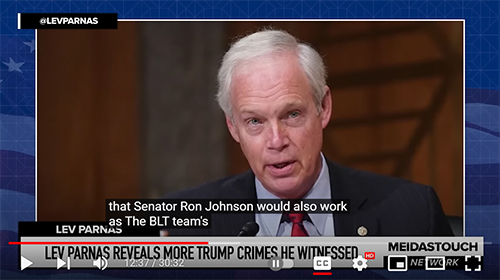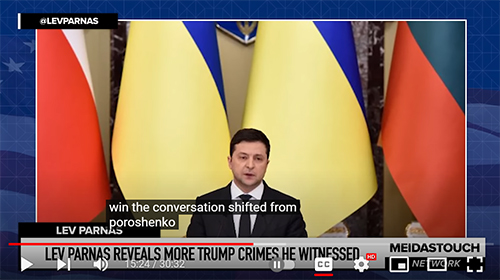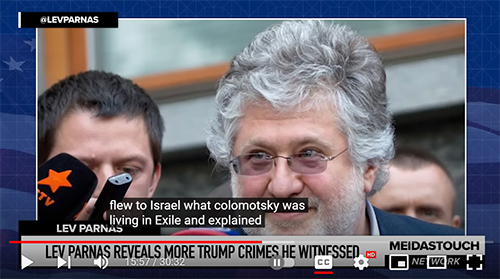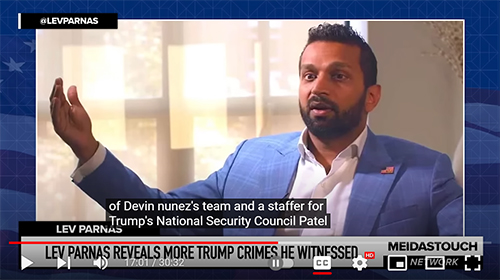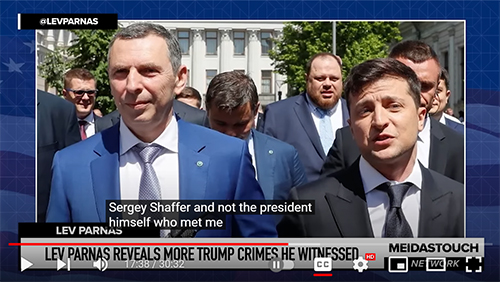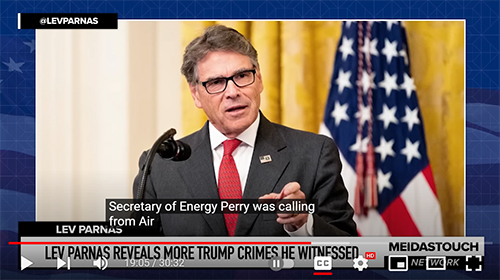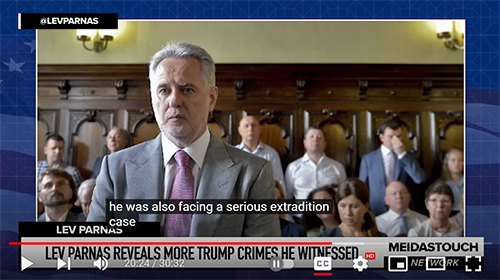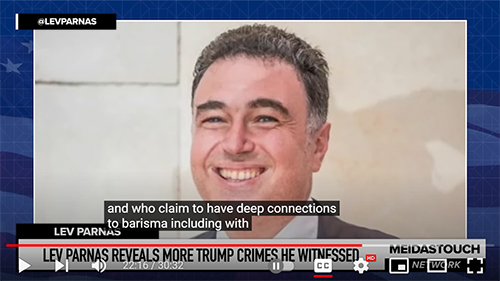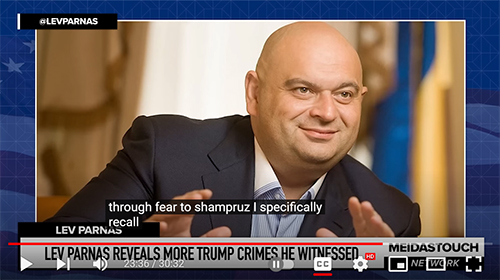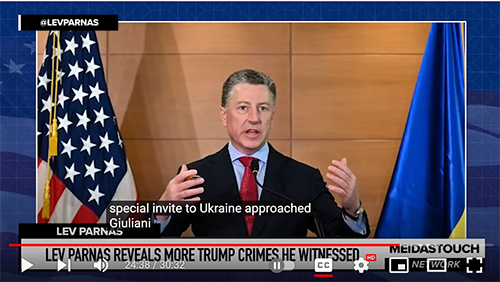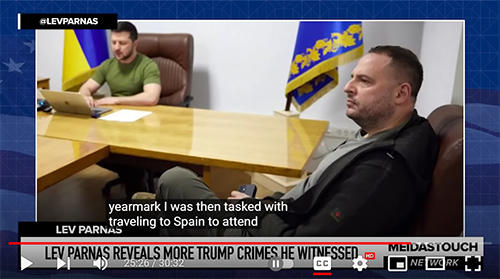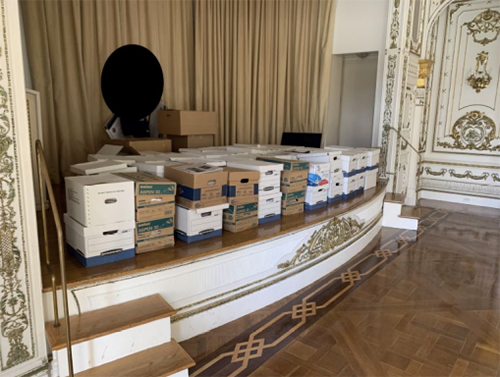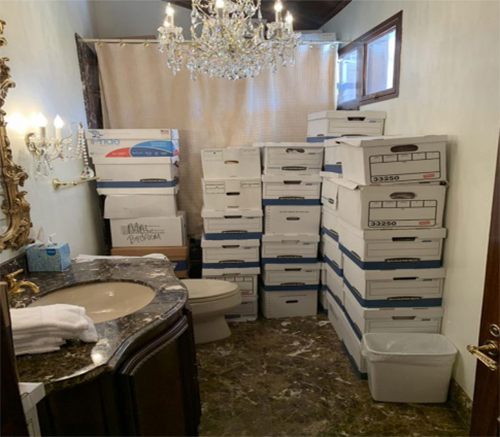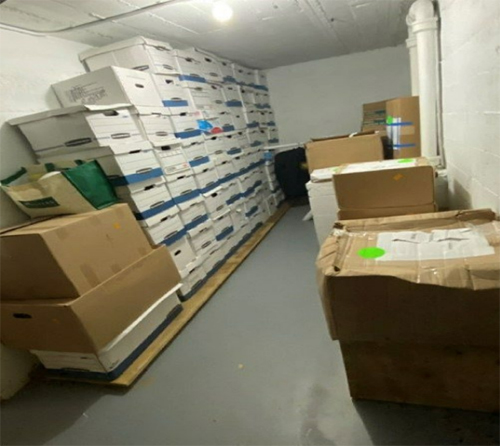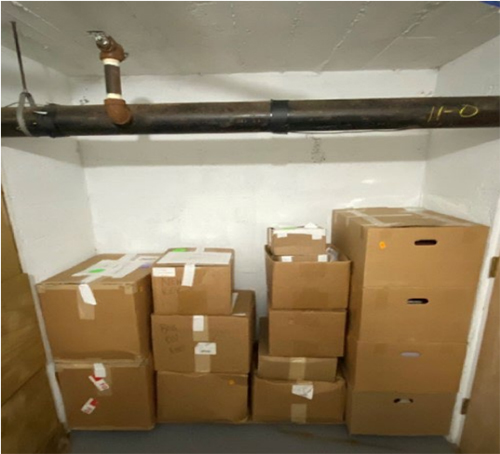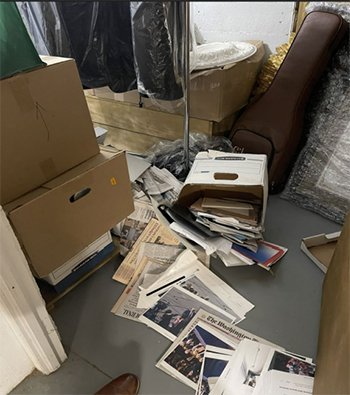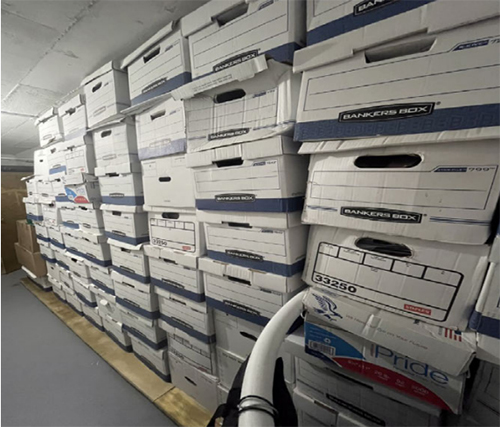by Lev Parnas
MeidasTouch
Jul 26, 2023
On today’s episode, Former Donald Trump and Rudy Giuliani Associate Lev Parnas reads from his exclusive letter to Rep. James Comer of the House Oversight Committee. His letter outlines Trump and Giuliani’s efforts to dig up dirt on the Biden family as well as their continued efforts to interfere with the highest levels of Ukrainian politics.
Transcript`
Hi everyone. Welcome to Lev Parnas's Diaries from home confinement. For those of you that don't know me, I used to be part of Donald Trump's inner circle, in Trump's cult. Donald Trump and Rudy Giuliani sent me to Ukraine to dig up dirt on Joe and Hunter Biden. Now that I'm out of the cult, and finishing up my sentence on home confinement, I want to share some of my diary stories with you.
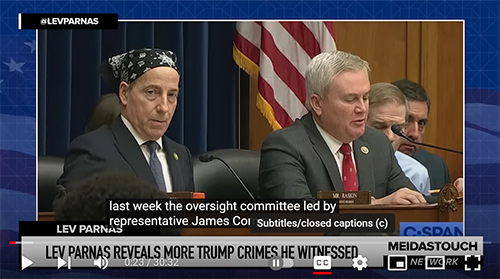
Last week the oversight committee, led by representative James Comer, held a hearing to spread more conspiracy theories into Joe and Hunter Biden. Representative Jamie Raskin read portions of my letter, and entered it into evidence.
Comer, Republicans' Investigative Chief, Embraces Role of Biden Antagonist: The fourth-term Kentuckian and chairman of the House Oversight and Accountability Committee has become an aggressive promoter of sinister-sounding claims about the president and his family.
Democrats accuse GOP of spreading 'racist conspiracy theories' in Biden docs probe
by Rebecca Beitsch and Brett Samuels
05/03/23 12:21 PM ET
The memo also condemns committee Chairman James Comer (R-Ky.), accusing him of misrepresenting Chung's testimony while spreading "false, xenophobic, and racist conspiracy theories."
The memo points to media appearances by Comer, including those in which he suggests Chung, who was born in South Korea, had ties to Hunter Biden and the Chinese Community Party, telling Fox's Maria Bartiromo, "We're looking into that."
Donald Trump becomes the first U.S. president to be impeached twice
All eyes on a Washington grand jury amid signs of possible third Trump indictment
by Stephen Collinson, CNN
Updated 9:22 AM EDT, Thu July 20, 2023
Like most of you, I've been watching the GOP, led by Senator Chuck Grassley, representative James Comer, and their cohorts like Marjorie Greene, continue to spread misinformation, and spread conspiracy theories, related to Joe and Hunter Biden, to confuse the American public.
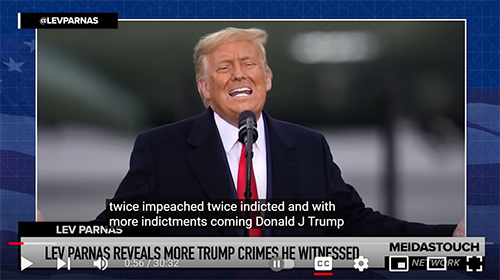
And most importantly to distract from the real criminal, their leader, twice-impeached, twice-indicted, and with more indictments coming, Donald J Trump.
I'm currently in the process of writing my tell-all book. It's called, "Shadow Diplomacy," detailing everything that transpired in the Trump's Administration pertaining to the Bidens, and much, much more. Since the book is not scheduled to be released for a few more months, as a concerned citizen, and someone that loves our country, I had to do more. I had to act now.
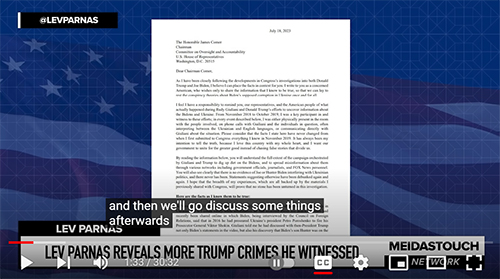
So I decided to take pen to paper and write James Comer a letter, describing what actually transpired in our year and a half long investigation into Hunter and Joe Biden. Now I'm going to read the letter to you, and then we'll go discuss some things afterwards.
"Dear Chairman Comer,
As I have been closely following the developments in Congress's investigations into both Donald Trump and Joe Biden, I believe I can place the facts in context for you. I write to you as a concerned American, who wishes only to share the information that I know to be true, so that we can lay to rest the conspiracy theories about Biden's supposed corruption in Ukraine once and for all.
I feel I have a responsibility to remind you, our representatives, and the American people of what actually happened during Rudy Giuliani and Donald Trump's efforts to uncover information about the Bidens in Ukraine. From November 2018 to October 2019, I was a key participant in and witness to these efforts; and every event described below, I was either physically present in the room with the people involved, on phone calls with Giuliani and the individuals in question, often interpreting between the Ukrainian and English languages, or communicating directly with Giuliani about the situation. Please consider that the facts I state here have never changed from when I first submitted to Congress everything I knew in November 2019. It has always been my intention to tell the truth, because I love this country with my whole heart, and I want our government to unite for the greater good instead of chasing false stories that divide us.
By reading the information below, you will understand the full extent of the campaign orchestrated by Giuliani and Trump to dig up dirt on the Bidens, and to spread misinformation about them through various networks including government officials, journalists, and FOX News personnel. You will also see clearly that there is no evidence of Joe or Hunter Biden interfering with Ukrainian politics, and there never has been. Statements suggesting otherwise have been debunked again and again. I hope that the breadth of my experiences, which are all backed up by the materials I previously shared with Congress, will provide that no stone has been unturned in this investigation.
Here are the facts as I know them to be true:
In November of 2018, I was approached by Rudy Giuliani, who asked me about my contacts in Ukraine and if I could verify some information he received about Joe Biden.
A video had been recently shared online in which Biden, being interviewed by Council on Foreign Relations, said that in 2016 he had pressured Ukraine's president Petro Poroshenko to fire his Prosecutor General Viktor Shokin.
Giuliani told me he had discussed with then-President Trump not only Biden's statements in the video, but also his discovery that Biden's son Hunter was on the board of the Ukrainian Energy company called Burisma and that Shokin was supposedly looking into possible corruption in the company. When Giuliani spoke to me, he got very excited and said, "This is the smoking gun [he'd] been looking for" -- meaning he saw it as a way to discredit the Bidens.
Later that month, I attended the Hanukkah celebration at the White House where Giuliani and Trump were both present. Trump approached me briefly to say, "Rudy told me good things. Keep up the good work." Then he gave me a thumbs-up in approval.
I met with Shokin for the first time in Ukraine in December of 2018. Giuliani had instructed me to relay a message to him, which was essentially that if he wanted to be reinstated as Prosecutor General -- a goal he expressed very openly -- that the Trump Administration could help him get his position back, but only if he provided hard evidence of Joe Biden's corruption. Initially Shokin said he had decided not to investigate Burisma further, but when I gave him Giuliani's message, he became shifty in his answers, admitting that his team was "looking into it" without giving further details.
I returned from Ukraine, Giuliani told me to ask Shokin to fly to the States to meet up with Senator Lindsey Graham, and when he was speaking to the visa authorities, he should tell them he was only going to California to see his daughter, not that he would then travel to Washington, D.C. to meet Graham.
However, when Shokin applied for his visa, then-Ambassador Marie Yavanovich denied him.
Communications ensued where Giuliani continued to pressure Shokin into helping him get information on the Bidens, although Shokin was being skeptical because Giuliani could not get him a visa approved, and he didn't understand how the president of the United States and his personal representative could not achieve something like that. Eventually they had a 45-minute Skype call in January 2019, where I served as an interpreter between the two of them, and of which there was a recording that I later submitted to Congress. The recording shows Giuliani aggressively asking Shokin for details on the Bidens. Even though Shokin was trying to push the narrative that he had lost his job because of the pressure Joe Biden had put on President Poroshenko to fire him, when asked directly by Giuliani, he conceded that there was no evidence of either Hunter or Joe Biden doing anything that interfered with Ukrainian law.
Giuliani continued to receive conspiracy theories from different sources, and remained insistent that there must be some data on the Bidens' corruption.
In late January 2019, my business partner Igor Fruman got word that Yuri Lutsenko, Shokin's replacement as Ukraine's Prosecutor General, was in New York and wanted to meet with Giuliani to discuss some legal matters. We set up the meeting in Giuliani's office on Park Avenue. There, Lutsenko explained he'd requested the meeting because he wanted to sit down with Bill Barr and, Attorney General to Attorney General, discuss the overall problem of Ukrainian and American corruption, including the funneling of Ukrainian money into American institutions. Giuliani stopped Lutsenko and said he wasn't interested in that, only in information concerning Joe and Hunter Biden. He then added statements to the effect that if Lutsenko wanted a conversation with Barr, he would need to offer a give and take, and Giuliani was interested in details about the Bidens.
Even though Lutsenko protested that he hadn't come to discuss the Bidens, he agreed to see what he could find for Giuliani. The next day, we all met again in Giuliani's office and Lutsenko brought a folder containing purported wire transfers from Burisma to Hunter Biden, and documents from the Prosecutor General's office outlining the company's hierarchy and organization from its CEO, Mykola Zlochevsky, on down. These documents did show what the Prosecutor General's office was doing in its investigation into Burisma, but again, there was no evidence in any of these materials that pointed to any criminal activity from Hunter Biden.
During the meeting, Giuliani stopped to call President Trump for about 3-5 minutes to update him on how the meeting was going with Lutsenko, and told Lutsenko that Trump was very happy with the help he was giving. He gave Lutsenko the thumbs-up.
Lutsenko then promised that if we went to Ukraine, he would help us meet with President Poroshenko and other officials who were dealing directly with the Burisma investigation. After the first meeting, Lutsenko kept pressuring Giuliani that he needed to meet Bill Barr. However, Giuliani eventually told Lutsenko he hadn't provided enough information, and that the only way he could meet Bill Barr was if he retained Giuliani for $200,000. He then gave Lutsenko a "contract." (It should be noted that Lutsenko refused to pay and to this day has never met Bill Barr.)
A few days later, Giuliani told me that he had decided that it might not be a good look for him to represent Ukrainian officials while representing Donald Trump, and introduced me to attorneys Victoria Toensing and DiGenova, who he said would represent Lutsenko instead. Later on, Giuliani told me that Toensing and DiGenova had agreed to split the $200,000 retainer fee in some part with him. In subsequent calls with Giuliani, Lutsenko was still upset and complaining about the whole situation, arguing that he shouldn't have to pay anything to meet one Attorney General to another, particularly because they had to discuss criminal matters between their respective countries.
In February 2019, Giuliani and I met Lutsenko in Poland, where the Prosecutor General was now more favorable to the idea of helping the Trump team investigate the Bidens.
He said President Poroshenko would meet with us, so Giuliani decided I should go straight from Poland to Ukraine on his behalf. I then had a three-hour meeting with Poroshenko. Giuliani's message to the president, who was running for re-election, was that Trump would support him and help him win if he made an official announcement of an investigation against Joe Biden.
Poroshenko was taken aback and relayed to me that he didn't trust Trump based on the bad deal they had made in 2018. At the time, he and Trump had met in the White House, and after the meeting one of Trump's aides suggested that Poroshenko should buy coal from a Pennsylvania Coal Company. The reason, they explained, was that Trump was about to have a rally in that part of the state and the purchase would be a good look for the relationship between the two countries. Poroshenko bought the coal, which was more expensive than Ukraine had paid for the same product from other sources, and he ended up having issues with the Ukrainian Parliament over the cost. After Trump had the rally, there were no further interactions between the two of them. So according to Poroshenko, he now had no reason to trust Trump, but he did tell me that he would wait to see what happened since the lines of communication had been opened.
Arriving back in the States, I began a series of regular meetings at the Trump International Hotel with Giuliani and what I later called the "BLT Team," because we always met at the BLT Steak restaurant in the hotel.
The BLT Team included Toensing, DiGenova, and John Solomon, an investigative reporter who was then working for The Hill and had many contacts at FOX News and the State Department, as well as having Trump on his speed dial. Solomon gave us information at the meetings that he said various sources had shared with him about the Bidens' dealings in Ukraine. Giuliani tasked me with traveling to Ukraine throughout March, April, and May 2019 to interview different people who had promised to give us information and evidence including records of bribes, bank records, and incriminating tapes.
Yet every time I went on these trips and conducted these interviews, I came up with nothing. Lutsenko kept assuring me that they would announce an investigation into the Bidens, but that never happened either.
Around the same time as the BLT Team began meeting, I was introduced by phone to Congressman Devin Nunes, who was leading his own separate investigation into the Bidens.
His team decided to work with the BLT Team, and I was told to keep in contact with Nunes's staff member Derek Harvey. While I was in Ukraine on these assignments, Nunes and Harvey asked me to help set up interviews that would facilitate their investigation. With my assistance, Harvey conducted numerous interviews with Ukrainian prosecutors and officials via Skype.
During this process, the prosecutors initially expressed an interest in meeting Nunes directly and having him conduct in-person interviews in Ukraine. But Nunes declined, explaining to me again by phone that because Republicans did not have control of the House, they would have to report any travel they were doing. Therefore, he believed it was better to have Derek Harvey conduct the interviews on Skype so the Democrats wouldn't know what was going on. On one occasion I even tried to set up an interview with Viktor Shokin for Harvey, but Shokin told me that there was no need because the two had already spoken.
At one point Victoria Toensing said that Senator Ron Johnson would also work as the BLT Team's "guy in the Senate" to push all the information that we were getting -- which still amounted to the same unverified conspiracy theories.
In March 2019, John Solomon had the idea to set up FOX News interviews with Poroshenko, Lutsenko and Nazar Kholodnytsky, the head prosecutor for the National Anti-Corruption Bureau of Ukraine (NABU). Shortly before his interview, Kholodnytsky had gotten caught up in some criminal activities and Marie Yovanovitch called for him to be ousted from his position. During the taping of his interview, instead of talking about the Bidens as planned, Kholodnytsky complained about Yovanovitch's interfering in Ukrainian politics. However, during his taping, he never validated nor confirmed that any illegal activities had been committed by either Hunter or Joe Biden. This statement upset Solomon and Giuliani, so the interview never aired on FOX.
Ten minutes before Poroshenko's interview was to take place, he decided not to participate. There was an intense phone conversation that I translated between Lutsenko and Giuliani, which ended with Giuliani telling Lutsenko that if he couldn't get Poroshenko to do the interview, not to call anymore.
During the argument with Giuliani, Lutsenko sent me an expletive-ridden text. I read the original in Russian, but the translation into English is essentially as follows, accommodating for language and context: "Sorry, but I didn't get a visit. But first, my president didn't get a damn thing. I'm ready to destroy your competitor, but you want more and more. You expect us to do everything, and everything we ask of you is "Later." It's not right. It's not fair."
Finally, Lutsenko then said he would do the interview and give us a big bombshell about the situation in Ukraine, which Giuliani expected to be about the Bidens. But during the interview, instead of talking about the Bidens, Lutsenko spoke about Yovanovitch's newly uncovered "Do Not Prosecute" list of names. It became a big scandal, but not long after that announcement, he retracted his statements. Giuliani was incredibly angry.
Every time Giuliani and Lutsenko had spoken about the Bidens, he would answer that nothing had been found to incriminate them. Neither Joe nor Hunter Biden had done anything against the Ukrainian constitution or local laws; there was no evidence of bribery or extortion that anyone could find. At the same time, Lutsenko was worried he wouldn't be able to stay in office if Poroshenko lost his bid for re-election, so he did what he could to stay on Trump and Giuliani's good side. To appease them, he would sometimes make vague statements to the media about Hunter and Joe Biden, but he never said they had committed any acts of corruption or that an investigation was being opened. There was simply nothing he had to substantiate those claims.
By that point, the BLT Team were watching the Ukrainian presidential elections and realized Volodymyr Zelenskyy was probably going to win.
The conversations shifted from Poroshenko and Lutsenko to getting a promise from Zelenskyy that he would announce an investigation into the Bidens following his win. Giuliani assumed that because Zelenskyy was an actor and comedian, not a politician, he would naturally want to do anything he could to establish a good relationship with the U.S.
I was tasked in April 2019 to go to Ukraine and get in contact with Zelenskyy. Yet my attempts to contact him were consistently blocked by Ihor Kolomoyskyi, a Ukrainian oligarch who was backing Zelenskyy financially.
Eventually I flew to Israel, where Kolomoyskyi was living in exile, and explained Giuliani and Trump's stance on the matter and why we needed Zelenskyy to commence an investigation into the Bidens. Giuliani had also instructed me to tell Kolomoyskyi that he would help with his legal problems in the U.S. if he would help us with Zelenskyy.
As you see, these are flagrant examples of Giuliani interfering in Ukrainian politics. Ironically, the very thing he was desperate to prove that the Bidens were doing in Ukraine -- and for which he could find no evidence at all -- was what he was guilty of.
By the end of April 2019, it was clear Zelenskyy would win in a landslide. We were preparing to set up a meeting between Zelenskyy and Giuliani, who was supposed to come to Ukraine on May 10th with Victoria Toensing. Giuliani had given me a letter which I handed over on May 9th to Arsen Avakov, the Minister of the Interior; the letter was to communicate to Zelenskyy that Giuliani wanted to discuss private matters pertaining to Trump, as he represented Trump in his personal capacity.
However, this meeting never occurred.
On May 11th, Giuliani called me frantically in the middle of the night, saying he'd been approached by Kash Patel, a member of Devin Nunes's team and staffer for Trump's National Security Council. Patel informed him that people in Zelenskyy's inner circle were Trump's enemies and that Giuliani could not meet in Ukraine now because it would be "a set-up."
Instead I was once again assigned to be the man on the ground, to meet with Zelenskyy myself on Giuliani and Trump's behalf and deliver a precise message in very strict words. Unless Zelenskyy announced an investigation into the Bidens the U.S. would not deliver certain promises: 1) Trump would tell Mike Pence not to attend Zelenskyy's inauguration, and 2), the U.S. would not send any aid to Ukraine, military or otherwise.
It would be Zelenskyy's Chief of Staff Sergei Shafer, and not the president himself, who met with me on that trip. After sharing a copy of the letter with Shafer via WhatsApp, I reiterated Giuliani's message for Zelenskyy to Shafer. Though he initially told me that Zelenskyy wanted a good relationship with the U.S. and would cooperate, we never heard from them after that. A few days later, I was told by Avakov, Minister of the Interior, that Zelenskyy was told not to speak to Giuliani or his team and that he should only go through proper channels with people at the U.S. Embassy. When I reiterated that message to Giuliani, he became enraged.
On May 13th, Ukrainian officials got confirmation from the U.S. that Mike Pence would not attend Zelenskyy's inauguration, which caused turmoil inside the Ukrainian government. They didn't want their people to realize that the U.S. were essentially pulling out of its promise to provide aid. When Kolomoyskyi found out, he returned to Ukraine, and was furious about the situation. He went to the media, calling Fruman and me grifters, stating they we were trying to force Zelenskyy to do unethical things, and threatening our lives. On his end, Giuliani then began sending bullying and threatening messages to Zelenskyy on Twitter and disparaging him on FOX News. He would question Zelenskyy's power as president, he would insist that Zelenskyy arrest Kolomoyskyi immediately, and repeat that Zelenskyy's inner circle was comprised of Trump's enemies, among other such statements.
It was then decided that Giuliani and I would fly to Paris to discuss next steps for Ukraine.
While in Paris, Giuliani received a call from Rick Perry, then Secretary of Energy. Perry was calling from Air Force Two, explaining that Trump had assigned him to represent the U.S. at Zelenskyy's inauguration and that he was "supposed to call Rudy" for his exact instructions. The call was on speaker, so I heard every word. Giuliani outlined to Perry that he needed to relay the same message to Zelenskyy after the inauguration ceremony: Announce an investigation into the Bidens, or the U.S. will pull its aid. Right after the inauguration, Perry called Giuliani to say he had delivered the message and Zelenskyy was willing to play ball.
But when Zelenskyy did make an announcement the following day, it was a statement about addressing general corruption in Ukraine, and never mentioned the Bidens. Giuliani was angry, communicating with Trump that the Ukrainians were playing games. We knew that at the same time, Trump was also making several attempts to deliver messages to Zelenskyy through other members of his team outside of Giuliani, and all with the same theme: investigate Joe Biden or else.
Near the end of our trip to Paris, we were introduced to one of Igor Fruman's associates, a friend who happened to be an employee of a Ukrainian oligarch named Dmitry Firtash, who had many political and business connections, including with the head of Burisma, Zlochevsky. When we returned to the U.S., we met with the BLT Team and John Solomon said Firtash's help would be key because of his relationship with Zlochevsky.
The problem was that Firtash would prove nearly impossible to contact.
He was also facing a serious extradition case to the U.S. for a number of bribery, racketeering and other charges since 2014. Solomon and Giuliani put together a package of documents regarding regarding confidential information in Firtash's case, and had me travel to Vienna in June 2019 to meet with Firtash, letting him know that Giuliani and our whole team were serious and that we could help him if he helped us. From June until the time of my arrest in October 2019, we had ongoing communications with Firtash.
In a meeting with the BLT Team, Solomon relayed to Giuliani that he had information that Robert Mueller's lead prosecutor Andrew Weissman offered Firtash a deal to cancel his extradition if he would testify against Trump and Putin. Firtash didn't want to get involved with the Biden versus Trump situation, but was open to helping us with Mueller's investigations into Trump. Thereafter, as I became an interpreter between Firtash's new legal team and Firtash, most of the conversations in which I participated were potentially privileged; however, I believe this information may be made available to the House Oversight Committee through a congressional subpoena.
But the true purpose of dangling this carrot in front of Firtash was to get him to use his contacts to pressure Zlochevsky to cooperate with the BLT Team. Eventually, Giuliani proposed a $1 million contract to represent Firtash. Later, similar to the Lutsenko situation, he took it back and had Firtash sign a contract with Victoria Toensing. Giuliani, however, would continue to oversee everything and remain in charge of matters related to Firtash. Then later Giuliani and Toensing had several phone calls that I was privy to with Bill Barr, leading to an unofficial meeting in the lobby at the Trump International Hotel, and then an official meeting at the Department of Justice.Giuliani worked aggressively to hire Ms. Dunphy, offering her what seemed like a once-in-a-lifetime opportunity to work as his Director of Business Development with a salary of $1 million per year plus expenses. As an added inducement, Giuliani also offered to provide pro bono legal representation to Ms. Dunphy in connection with an ongoing dispute arising from an abusive ex-partner....
-- Noelle Dunphy, Plaintiff, against Rudolph W. Giuliani, et al, Defendants.
At the same time, the BLT Team was exploring many different angles to get information on the Bidens.
In June, Giuliani asked me to accompany him to a lunch in New York with Vitaly Pruss, a Russian businessman who claimed to have deep connections to Burisma, including with Hunter Biden's business partner Devon Archer, and had recommended powerful people to Zlochevsky that he should put on the company's board. During this meeting, Pruss shared a story with us: He said earlier that year, while doing business related to Burisma, he had taken Hunter Biden to meet Kazakhstan's minister of foreign affairs, and that Biden had gotten substantially intoxicated with drugs and alcohol on this trip. While he was incapacitated, his laptop was compromised and copied by a representative of FSB (Russia's secret police) and members of Zlochevsky's team.
It's important to note that certain aspects of Pruss's story are verifiably true. This trip with Hunter Biden did happen, and his computer hard drives were taken and duplicated. But Pruss specified that while the contents of the laptop were personally embarrassing to Hunter Biden -- pictures of him doing drugs and surrounded by girls -- there was no evidence of financial crimes or any data on his laptop that suggested the illegal activities of any other kind, which is the sort of proof that Giuliani desperately needed. Pruss never mentioned anything about the hard drives containing criminal information, only the embarrassing images. It was not until Giuliani began disseminating the story of Hunter Biden's laptop that the idea of proof of financial and political crimes was introduced.
Giuliani continued this simultaneous efforts to reach Zlochevsky through Firtash and Pruss.
I specifically recall that Giuliani told me to tell Pruss to pressure Zlochevsky by saying that he could be "an enemy or a friend of Trump." At a meeting of the BLT Team, Giuliani and Solomon came up with a series of 12-14 questions about the Bidens that we would propose to Zlochevsky. Eventually, we managed to get Zlochevsky's answers back. But his answers gave us nothing -- because there was nothing. On reading Zlochevsky's reply, Giuliani turned red and yelled, "What is this shit? This is bullshit. Make sure nobody sees this. Bury this."
I will remind you that Zlochevsky's answers are in the report that the House Oversight Committee published. In this document, he stated that Hunter Biden was never asked or assigned to speak with anybody in the U.S. on behalf of Burisma, that there were no political lobbying efforts on behalf of Burisma, that nobody from the company had ever spoken to Joe Biden, and that Hunter Biden was essentially innocent of what people had been implying. His letter debunked all the conspiracy theories.
In August 2019, Kurt Volker, Trump's Special Envoy to Ukraine, approached Giuliani. He said that Trump had written Zelenskyy off and wasn't talking to him, but wanted Giuliani to emphasize to Trump that the relationship with Zelenskyy was crucial. He stressed that Zelenskyy needed to get support from the U.S. in Ukraine's ongoing war with Russia. While at a meeting that I was present at with Giuliani and Volker at the Trump International Hotel in Washington, it was agreed that if Giuliani opened the communication channels with Zelenskyy and Trump, as well as invited Zelenskyy to the White House, then Zelenskyy would announce an investigation into the Bidens. A later meeting with Volker, Giuliani, and then U.S. ambassador to the European Union Gordon Sondland, and Rick Perry took place to discuss the details of the investigation announcement in a phone call with Zelenskyy's chief of staff Andriy Yermark.
I was then tasked with traveling to Spain to attend a meeting with Yermark and Giuliani. In that meeting, Giuliani pressured Yermark to tell Zelenskyy to make the announcement about the Bidens. Giuliani also brought up Vitali Klitschko, the mayor of Kiev, who he had met with several times in New York. He informed Yermark that he knew Zelenskyy wanted to fire Klitschko and emphasized that this would be a bad idea, because Klitschko was well liked by Trump and the American people.
Again, this is a blatant example of Giuliani interfering in foreign politics. Zelenskyy's aim was to clear out corruption in the Ukrainian government. Unfortunately, the war has limited Zelenskyy's opportunities to address this. However, there was no possible reason why Giuliani should have been suggesting who should play any role in the Ukrainian government.
In the early part of October 2019, I got a call telling me to go to Vienna with Giuliani, where the former Chief Financial Officer of Burisma, Alexander Gorbunenko, would meet Giuliani and give us Hunter Biden's hard drive and answer any questions we had. My Ukrainian contacts also told me they would have Viktor Shokin in Vienna to give an interview to Sean Hannity of FOX News, because Shokin was supposed to appear in a Viennese court on behalf of Dimitry Firtash, giving sworn testimony in court that would basically be saying what Giuliani wanted him to say -- that he was fired because of Joe Biden. (As mentioned earlier, Biden did make statements that he had helped to get Shokin fired, but Ukrainian investigations into the matter some years later concluded that Shokin had been terminated because of multiple cases of corruption while in office.)
I have text messages confirming all these plans, and all are among the materials I submitted to Congress during the first impeachment inquiry. These include messages from Hannity setting up the interview, and messages coordinating that Giuliani, Toensing, and I would go to Vienna to meet Burisma's ex-CFO Gorbunenko. Just before we were to fly to Austria, there was a meeting at FOX News in Washington, because Solomon was appearing that night on Hannity's show and Giuliani was appearing in Laura Ingraham's. The BLT Team got together in a FOX conference room and discussed how we would blow up the story once we got Hunter Biden's hard drive in Vienna.
The next morning Giuliani met me for breakfast and said that Trump needed him at the White House, he would be unable to go to Vienna. He insisted Fruman and I should go and set up everything and he would join us later. Toensing then contacted me to say that she would not go to Vienna either because her husband had a cold. Shortly afterward, on October 9, 2019, Fruman and I were arrested at Dulles International Airport while trying to make the first leg of our flight to Vienna.
Throughout all these months of work, the extensive campaigns and networking done by Trump allies and Giuliani associates, including the enormously thorough interviews and assignments that I undertook, there has never been any evidence that Hunter or Joe Biden committed any crimes related to Ukrainian politics. Never, during any of my communications with Ukrainian officials or connections to Burisma, did any of them confirm or provide concrete facts linking the Bidens to illegal activities. In fact, they asked me multiple times why our team was so concerned with this idea. The truth is that everyone, from Giuliani and the BLT Team to Devin Nunes and his colleagues, to the people at FOX News, knew that these allegations against the Bidens were false. There has never been any factual evidence, only conspiracy theories spread by people who knew exactly what they were doing.
With all due respect, Chairman Comer, the narrative you are seeking for this investigation has been proven false many times over, by a wide array of respected sources. There is simply no merit to investigating this matter any further. I hope my letter has provided you with additional clarity on this point.
Please know that in my sharing this information with you, I am not looking for any sympathy for myself. I take full responsibility for my own actions in this matter, and I am extremely remorseful for my participation. In explaining the full context to you here, I can only hope that my truth can be used for the greater good. Please abandon this effort to investigate the Bidens, which is nothing more than a wild goose chase, and let our elected officials return to the issue at hand of uniting our great country to be stronger and better than ever before.
I am willing to testify under oath in Congress regarding any of these matters, and answer any questions that you might have, or provide you with any texts or correspondence in these situations I have described in this letter. You may contact me through my attorney Joseph A. Bondy, who can be reached by phone at [DELETE].
Thank you for your consideration.
Sincerely,
Lev Parnas
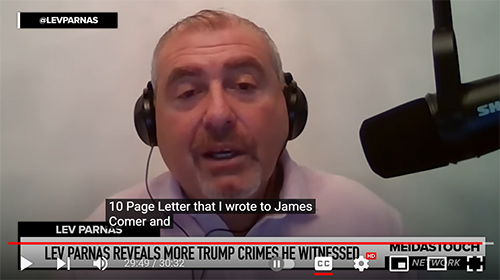
So there you have it folks. That was my 10-page letter that I wrote to James Comer. And what did he do? He basically looked the other way, just like they do all time. Because they don't want the truth. They don't want to get to the bottom of it. All they want to do is give you bits and pieces, they want to give you conspiracy theories, they want to confuse the people all for the simple fact: to deflect from the real criminal, like I said, Donald J Trump.
Thank you for watching. You can follow me on Twitter or Threads or Instagram at LevParnas. And please make sure to subscribe to the Meidas touch Network.

